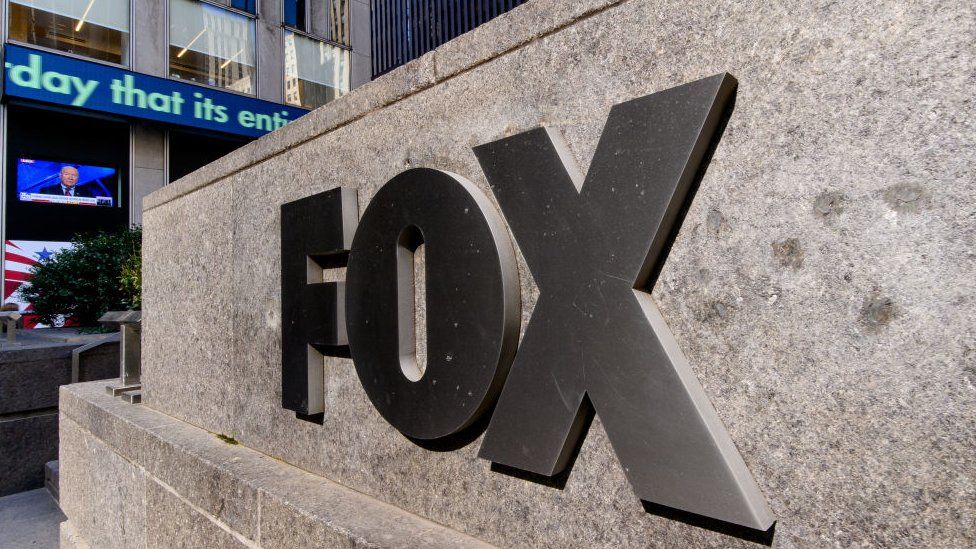ARTICLE AD BOX
 Image source, Getty Images
Image source, Getty Images
Dominion accuses Fox News of knowingly repeated false claims about the 2020 US elections
By Bernd Debusmann Jr
BBC News, Washington
One of the most anticipated defamation trials in recent US history is about to start, pitting one of the world's most famous news brands against a little known voting technology firm.
At stake is the reputation of Fox News, the strength of US libel laws versus the right to free speech and a sense of where the false 2020 election claims go next.
The start of the trial was postponed until Tuesday amid reports the two sides are in settlement talks.
Here's a few key questions about the case and what to look for if it goes to trial.
What exactly is Fox accused of?
In the lawsuit, Dominion Voting Systems - whose equipment was used in 28 states during the election - argues that Fox News on-air personalities regularly repeated and amplified anti-Dominion conspiracy theories and demonstrably false claims about the firm in order to avoid a backlash from a largely pro-Trump audience.
These claims, for example, included assertions that Dominion altered voting results and that it worked with late Venezuelan leader Hugo Chavez to create machines that would "make sure he never lost an election".
Dominion claims that these allegations hurt the company's business and its reputation - and is now seeking $1.6bn (£1.3bn) in damages.
To prove that defamation took place, Dominion's lawyers will have to argue that Fox News willingly and knowingly provided false information to its viewers, despite knowing that the information was untrue.
Their case will rely heavily on emails, text messages and depositions showing that Fox employees - ranging from producers and journalists to on-air personalities and executives - in which they questioned and belittled the claims about Dominion.
How will Fox defend itself?
Ahead of the trial, Judge Eric Davis ruled that the claims made against Dominion have already been proven false.
This means that jurors are not expected to deliberate on the validity of claims themselves.
Instead, they will have to decide whether Fox acted with "actual malice" by knowingly providing falsehoods to its viewers, despite knowing that the information was untrue.
To defend itself against these claims, Fox's attorneys will argue that its reporting on Dominion was legitimate journalism in which its reporters and commentators reported on fraud allegations, rather than endorsing them.
"It is plain as day that any reasonable viewer would understand that Fox News was covering and commenting on allegations about Dominion," a Fox court filing argued. "Not reporting that the allegations were true."
This sort of coverage, Fox has claimed, is protected by the First Amendment to the US Constitution which guarantees freedom of expression and the press.
In a statement sent to the BBC in February, Fox also claimed that the Dominion lawsuit "mischaracterizes the facts by cherry-picking soundbites, omitting key context, and mischaracterizing the record".
Will Rupert Murdoch testify?
One highlight of the upcoming court proceedings will be the expected appearance of Rupert Murdoch, the billionaire owner of Fox News.
While his appearance has not been confirmed, Bloomberg - citing people familiar with the lawsuit - has reported that Mr Murdoch is expected to testify as early as Monday or Tuesday.
If he does testify, Mr Murdoch will face questions by Dominion's attorneys about the Fox News hosts and guests who made unsubstantiated claims about Dominion, as well as about his role in the coverage.
Image source, Getty Images
Image caption,Rupert Murdoch is expected to testify alongside several other Fox figures, including his son Lachlan.
In a sworn deposition filed in February, Mr Murdoch appeared to acknowledge that many of the claims were baseless and without merit, and said that he did not personally believe that Dominion "engaged in a massive and coordinated effort to steal the 2020 presidential election".
"Some of our commentators were endorsing it," he said in the deposition, referring to falsehoods about Dominion. "I would have liked us to be stronger in denouncing it, in hindsight."
Mr Murdoch's son Lachlan - the CEO of Fox Corp, one of the defendants in the case - is also expected to testify.
What about Tucker Carlson?
Among the Fox News TV hosts that is expected to testify is Tucker Carlson, host of the network's top-rated programme.
Court documents have revealed that Mr Carlson - a vocal supporter of Donald Trump - was privately contemptuous of the former president and dismissive of many of the claims against Dominion, calling them "absurd" and "insane".
"I hate him [Trump] passionately," reads one text message from Mr Carlson that was included in Dominion's court documents. "What he's good at is destroying things. He's the undisputed world champion of that."
In another message, Mr Carlson said he felt that Fox was "very close" to being able to ignore Mr Trump.
"I truly can't wait," he wrote.
Why does the outcome matter?
Experts have noted that the outcome of the trial could have a far-reaching impact on libel and defamation cases in the US, as well as on future political and election coverage in the future.
If Dominion wins, the network may need to be more cautious when amplifying potentially false claims in the upcoming 2024 election.
Alternatively, a Fox victory would solidify the extremely high bar set for defamation cases in the US, and give the network the legal grounds to be able to report false claims again in the future.
However, a Dominion win may also lead to other news outlets being sued in the future, potentially even in cases in which they behaved in good faith.
"I don't see a victory for Dominion as a victory for the news media, by any means," Jane Kirtley, a former executive director of the Reporters Committee for Freedom of the Press, was quoted as saying by the New York Times.
"As an ethicist, I deplore a lot of what we've learned about Fox, and I would never hold it up as an example of good journalistic practices," Ms Kirtley said.
"But I've always believed that the law has to protect even those news organisations that do things the way I don't think they should do it. There has to be room for error."

 2 years ago
52
2 years ago
52








 English (US) ·
English (US) ·